According to a recent poll, women spend $426 billion dollars a year on makeup and skin products. If only there was a way to improve your skin, complexion, lines and wrinkles without dishing out thousands of dollars a year on expensive products. Well there is. As it turns out, beauty is not only skin deep. Instead, true beauty and great skin come from what we eat and how we live.
Have you noticed how public figures, celebrities and health advocates seem to age so gracefully? Often times, these figures are idolized for their magnificent skin and youthful appearance, and assumptions are made about the team of makeup artists and doctors responsible for that look. While they may have access to more support than the average person, the foundation of their rich complexion often comes from the healthy lifestyles they have grown accustomed to.
As a weight loss physician, I see patients achieving life transforming wellness every day. Their glow radiates as they twirl in the mirror in a skirt that's one size smaller, or grin ear to ear because they finally feel well after years of food sensitivities and discomfort. The glow is real, and it's not from a product you can buy in the beauty isle. After a complete body change, my patients notice their radiance, as well as how much their complexion has improved after eating a healthy diet. They look years younger as a result of living a healthier lifestyle. Choosing a lifestyle with whole foods and nutritionally balanced meals affects not just weight, but your skin as well. Here are some tips to start you on your way to a healthier lifestyle and radiant skin.
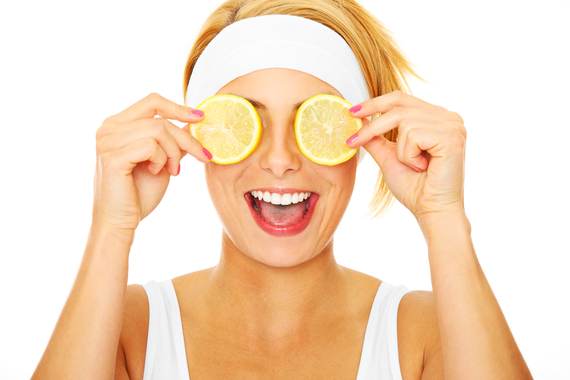
Don't forget vitamin C: According to a study on dietary nutrient intake and skin-aging in middle-aged American women conducted by The American Journal of Clinical Nutrition , higher vitamin C intake was associated with a lower likelihood of a wrinkled appearance, regardless of age, race, sunlight exposure, menopausal status and other lifestyle factors. Vitamin C promotes collagen synthesis, which is vital is skin elasticity and wards off wrinkles. Good sources of vitamin C include peppers, kale, broccoli, cauliflower, and mango.
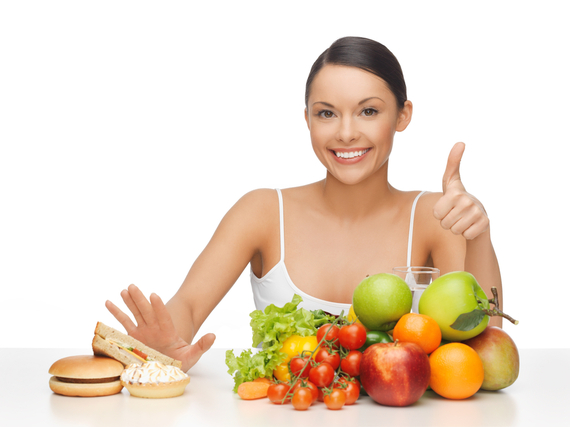
Cut out simple carbohydrates: The same study cited above found that a 50 gram decrease per day in carbohydrates, most notably simple carbohydrates such as processed, sugary foods, led to less likelihood of wrinkle appearance and skin atrophy, regardless of lifestyle factors. Carbohydrates in your diet should be filled with fiber, and two great sources of healthy carbs are vegetables and legumes.
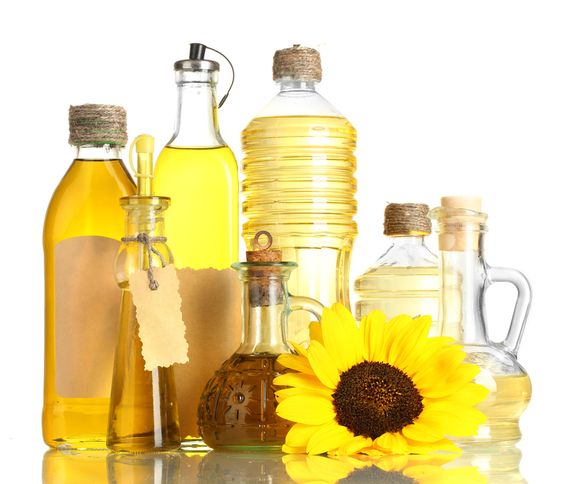
Focus on fat: While you're probably expecting to hear that you should focus on eliminating fat, the reality is that some fat is not only healthy, but vital to your health and beauty. The trick is choosing the right kinds of fat. Linoleic acid, an unsaturated omega-6 fatty acid, is shown to reduce senile dryness and reduce skin atrophy. Linoleic acid is found in cooking oils such as safflower, grape seed, and sunflower oil. Unsaturated fats, such as linoleic acid, contain omegas that improve skin quality and health. Steer clear of saturated fats, such as butter or lard, which can cause inflammation and oil build up in arteries and on your skin surface.

Eat more chicken: The biggest difference I help people make in their diet is getting enough protein spread throughout the day. Lean, adequate protein in essential for a healthy diet and functioning metabolism, and the amino acids it provides are necessary for tissue growth and repair. In fact your skin, nails and hair are made from amino acids and getting enough daily is essential for youthful, vibrant skin. The average woman should aim for 80 to 100 grams per day, and it is important for protein intake to be spread out over the course of the day instead of just once a day in a large dinner serving that is quite typical of the American diet. Chicken and cold water fish are excellent sources of protein. Healthy snacks during the day are just as important, and should contain close to 10 grams of protein each. The vast majority of "snack" foods are composed of simple carbohydrates such as sugars and starches. A little healthy protein such as nut butters, hummus or lower fat cheese along with vegetables and fruit make a much better snack.
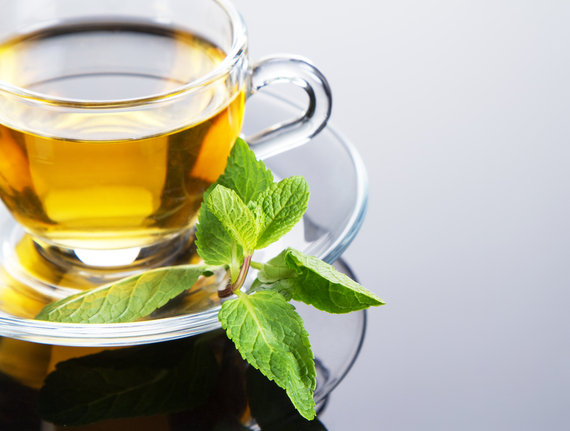
Go green: Green tea is an amazing antioxidant that can help keep you hydrated and reduce inflammation. A cup of green tea provides around 10-40 mg of polyphenols (plant antioxidants) and has antioxidant activity greater than a serving of broccoli, spinach, carrots, or strawberries. An antioxidant is a scavenger of damaging free radicals -- molecules with an imbalance of electrons. Free radicals can wreak havoc on your cell membranes, causing the damaged cells to age prematurely. A great replacement for an afternoon coffee, green tea has naturally occurring caffeine. Aim for organic varieties without added sugar or preservatives for the best results.
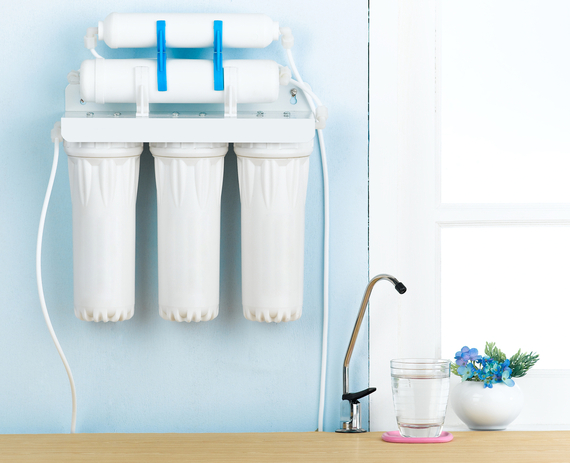
The right water: While it has become common knowledge that drinking plenty of water is a key to improving overall health and skin quality, I recommend a reverse osmosis system that filters tap water through a semi-permeable membrane, removing impurities. This system will rid your water of added chemicals, such as chlorine, for the purest water and radiant skin. It is even better if you can use water bottles composed of stainless steel or glass as you hydrate to avoid chemicals that are found in some plastics that can disrupt your hormone balance.
from Healthy Living - The Huffington Post http://ift.tt/1mqUS1K
via IFTTT
Have you noticed how public figures, celebrities and health advocates seem to age so gracefully? Often times, these figures are idolized for their magnificent skin and youthful appearance, and assumptions are made about the team of makeup artists and doctors responsible for that look. While they may have access to more support than the average person, the foundation of their rich complexion often comes from the healthy lifestyles they have grown accustomed to.
As a weight loss physician, I see patients achieving life transforming wellness every day. Their glow radiates as they twirl in the mirror in a skirt that's one size smaller, or grin ear to ear because they finally feel well after years of food sensitivities and discomfort. The glow is real, and it's not from a product you can buy in the beauty isle. After a complete body change, my patients notice their radiance, as well as how much their complexion has improved after eating a healthy diet. They look years younger as a result of living a healthier lifestyle. Choosing a lifestyle with whole foods and nutritionally balanced meals affects not just weight, but your skin as well. Here are some tips to start you on your way to a healthier lifestyle and radiant skin.
Don't forget vitamin C: According to a study on dietary nutrient intake and skin-aging in middle-aged American women conducted by The American Journal of Clinical Nutrition , higher vitamin C intake was associated with a lower likelihood of a wrinkled appearance, regardless of age, race, sunlight exposure, menopausal status and other lifestyle factors. Vitamin C promotes collagen synthesis, which is vital is skin elasticity and wards off wrinkles. Good sources of vitamin C include peppers, kale, broccoli, cauliflower, and mango.
Cut out simple carbohydrates: The same study cited above found that a 50 gram decrease per day in carbohydrates, most notably simple carbohydrates such as processed, sugary foods, led to less likelihood of wrinkle appearance and skin atrophy, regardless of lifestyle factors. Carbohydrates in your diet should be filled with fiber, and two great sources of healthy carbs are vegetables and legumes.
Focus on fat: While you're probably expecting to hear that you should focus on eliminating fat, the reality is that some fat is not only healthy, but vital to your health and beauty. The trick is choosing the right kinds of fat. Linoleic acid, an unsaturated omega-6 fatty acid, is shown to reduce senile dryness and reduce skin atrophy. Linoleic acid is found in cooking oils such as safflower, grape seed, and sunflower oil. Unsaturated fats, such as linoleic acid, contain omegas that improve skin quality and health. Steer clear of saturated fats, such as butter or lard, which can cause inflammation and oil build up in arteries and on your skin surface.
Eat more chicken: The biggest difference I help people make in their diet is getting enough protein spread throughout the day. Lean, adequate protein in essential for a healthy diet and functioning metabolism, and the amino acids it provides are necessary for tissue growth and repair. In fact your skin, nails and hair are made from amino acids and getting enough daily is essential for youthful, vibrant skin. The average woman should aim for 80 to 100 grams per day, and it is important for protein intake to be spread out over the course of the day instead of just once a day in a large dinner serving that is quite typical of the American diet. Chicken and cold water fish are excellent sources of protein. Healthy snacks during the day are just as important, and should contain close to 10 grams of protein each. The vast majority of "snack" foods are composed of simple carbohydrates such as sugars and starches. A little healthy protein such as nut butters, hummus or lower fat cheese along with vegetables and fruit make a much better snack.
Go green: Green tea is an amazing antioxidant that can help keep you hydrated and reduce inflammation. A cup of green tea provides around 10-40 mg of polyphenols (plant antioxidants) and has antioxidant activity greater than a serving of broccoli, spinach, carrots, or strawberries. An antioxidant is a scavenger of damaging free radicals -- molecules with an imbalance of electrons. Free radicals can wreak havoc on your cell membranes, causing the damaged cells to age prematurely. A great replacement for an afternoon coffee, green tea has naturally occurring caffeine. Aim for organic varieties without added sugar or preservatives for the best results.
The right water: While it has become common knowledge that drinking plenty of water is a key to improving overall health and skin quality, I recommend a reverse osmosis system that filters tap water through a semi-permeable membrane, removing impurities. This system will rid your water of added chemicals, such as chlorine, for the purest water and radiant skin. It is even better if you can use water bottles composed of stainless steel or glass as you hydrate to avoid chemicals that are found in some plastics that can disrupt your hormone balance.
from Healthy Living - The Huffington Post http://ift.tt/1mqUS1K
via IFTTT
No comments:
Post a Comment